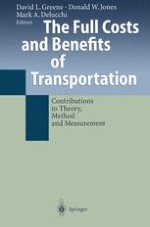Modern transportation systems have pervasive and far-reaching effects on society and the environment. Mobility and other benefits of modern transportation arrive with many, serious undesired consequences:deaths and injuries in transport accidents, pollution of air,water and groundwater,noise congestion, greenhouse gas emissions etc. Governments and markets both play critical roles in providing infrastructure and operating and policing transportation systems. As world transport systems expand and become increasingly motorized, the transportation community is searching for transportation systems that are both efficient and sustainable.In this book leading international researchers explore the issues and concepts and define the state of knowledge concerning transportation's full costs and benefits.
